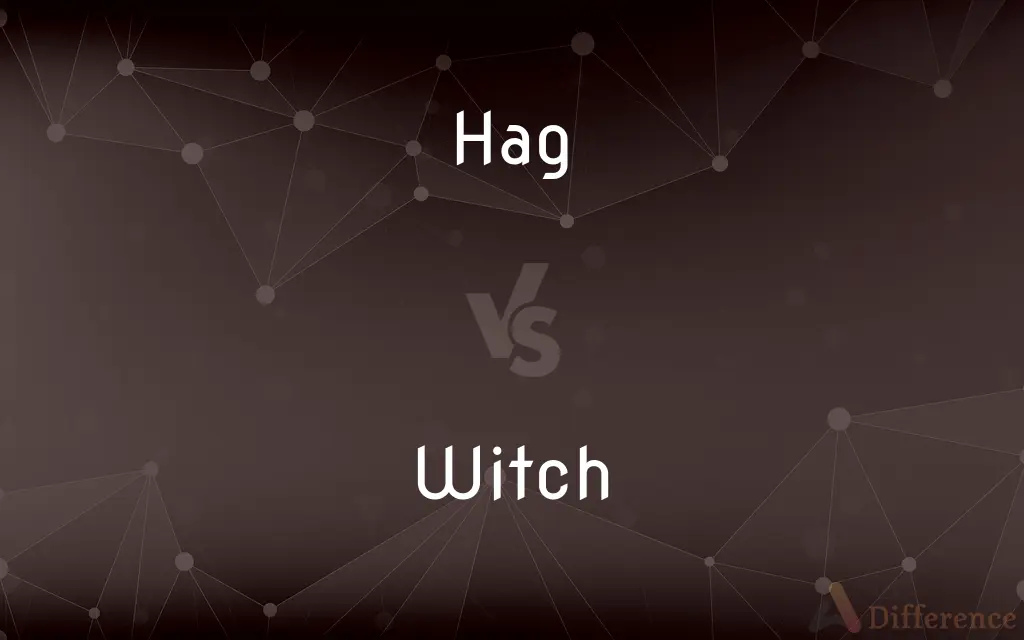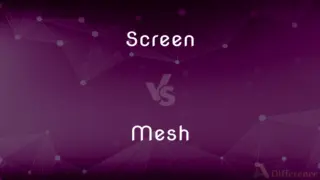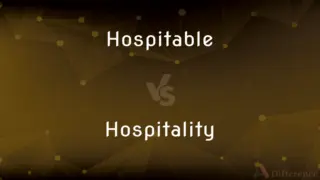Hag vs. Witch — What's the Difference?
Edited by Tayyaba Rehman — By Fiza Rafique — Updated on April 6, 2024
A hag is often portrayed as an ugly, old woman, sometimes with malicious intentions, while a witch is a practitioner of witchcraft, potentially of any age or appearance.

Difference Between Hag and Witch
Table of Contents
ADVERTISEMENT
Key Differences
A hag is typically depicted in folklore and fairy tales as an old, ugly woman who lives in seclusion and is often associated with evil deeds or omens. While a witch, on the other hand, is characterized by their practice of witchcraft, which can involve spells, magic, and the supernatural, regardless of their appearance or age.
The term "hag" has its roots in descriptions of appearance and demeanor, implying a physical and moral repulsiveness. Whereas the term "witch" focuses more on the individual's abilities and practices in the realm of magic and sorcery, not necessarily linked to their physical appearance.
In many cultures, hags are seen as embodiments of the darker aspects of femininity and old age, symbolizing decay and the uncanny. Witches, however, are more broadly defined by their connection to witchcraft, making the term encompass a wider range of figures, from malevolent sorcerers to wise healers.
The portrayal of hags is often without redemption, seen only as villains or obstacles to be overcome in stories. Witches, however, can be depicted as either malevolent or benevolent figures, with some stories highlighting their knowledge, wisdom, or misunderstood nature.
While hags are almost exclusively negative figures, the concept of a witch can be empowering, representing a figure of power, autonomy, and resistance against societal norms, especially in contemporary interpretations.
ADVERTISEMENT
Comparison Chart
Definition
An old, ugly woman often associated with evil.
A practitioner of witchcraft, of any appearance.
Roots
Focus on appearance and demeanor.
Focus on magical abilities and practices.
Cultural Symbolism
Decay, darkness, and the uncanny aspect of femininity.
Power, autonomy, and connection to the supernatural.
Portrayal
Almost exclusively negative and villainous.
Can be both malevolent and benevolent.
Societal Role
Embodiments of feared aspects of old age and femininity.
Figures of resistance, knowledge, or power.
Compare with Definitions
Hag
A figure of terror in folklore.
Children were warned about the hag who steals away the night.
Witch
Often misunderstood figure in folklore.
The witch in the tale was actually a benevolent guardian.
Hag
An old, malicious woman.
The fairy tale spoke of a hag who cursed the kingdom.
Witch
A practitioner of witchcraft.
The village witch was sought for her healing spells.
Hag
A pejorative term for an older woman.
The term hag is often used derogatorily.
Witch
Can be malevolent or benevolent.
Stories depict witches as either saviors or villains.
Hag
Synonym for a witch, with emphasis on ugliness.
Legends tell of a hag haunting the woods.
Witch
A symbol of female power.
The witch represents autonomy and resistance against patriarchal norms.
Hag
A representation of decay.
The hag in the story symbolizes the fear of aging.
Witch
Associated with spells and magic.
Witches are known for their ability to cast spells.
Hag
A hag is a wizened old woman, or a kind of fairy or goddess having the appearance of such a woman, often found in folklore and children's tales such as "Hansel and Gretel". Hags are often seen as malevolent, but may also be one of the chosen forms of shapeshifting deities, such as The Morrígan or Badb, who are seen as neither wholly benevolent nor malevolent.
Witch
A person, especially a woman, claiming or popularly believed to possess magical powers and practice sorcery.
Hag
(Offensive) An old woman considered to be ugly or frightening.
Witch
A believer or follower of Wicca; a Wiccan.
Hag
A witch; a sorceress.
Witch
(Offensive) An old woman considered to be ugly or frightening.
Hag
(Obsolete) A female demon.
Witch
A woman considered to be spiteful or overbearing.
Hag
A hagfish.
Witch
(Informal) A woman or girl considered to be charming or fascinating.
Hag
A boggy area; a quagmire.
Witch
One particularly skilled or competent at one's craft
"A witch of a writer, [she] is capable of developing an intensity that verges on ferocity" (Peter S. Prescott).
Hag
A spot in boggy land that is softer or more solid than the surrounding area.
Witch
To work or cast a spell on; bewitch.
Hag
A cutting in a peat bog.
Witch
To cause, bring, or effect by witchcraft.
Hag
A witch, sorceress, or enchantress; a wizard.
Witch
To use a divining rod to find underground water or minerals; dowse.
Hag
(pejorative) An ugly old woman.
Witch
A person who practices witchcraft.
Hag
(derogatory) An evil woman.
Witch
(now usually particularly) A woman who is learned in and actively practices witchcraft.
Hag
A fury; a she-monster.
Witch
An ugly or unpleasant woman.
I hate that old witch.
Hag
A hagfish; one of various eel-like fish of the family Myxinidae, allied to the lamprey, with a suctorial mouth, labial appendages, and a single pair of gill openings.
Witch
One who exercises more-than-common power of attraction; a charming or bewitching person.
Hag
A hagdon or shearwater; one of various sea birds of the genus Puffinus.
Witch
One given to mischief, especially a woman or child.
Hag
(obsolete) An appearance of light and fire on a horse's mane or a person's hair.
Witch
(geometry) A certain curve of the third order, described by Maria Agnesi under the name versiera.
Hag
The fruit of the hagberry, Prunus padus.
Witch
The storm petrel.
Hag
Sleep paralysis.
Witch
Any of a number of flatfish:
Hag
A small wood, or part of a wood or copse, which is marked off or enclosed for felling, or which has been felled.
Witch
Glyptocephalus cynoglossus (Torbay sole), found in the North Atlantic.
Hag
A quagmire; mossy ground where peat or turf has been cut.
Witch
Lepidorhombus whiffiagonis (megrim), found in the North Atlantic.
Hag
(transitive) To harass; to weary with vexation.
Witch
Arnoglossus scapha, found near New Zealand.
Hag
A witch, sorceress, or enchantress; also, a wizard.
Witch
The Indomalayan butterfly Araotes lapithis, of the family Lycaenidae.
Hag
An ugly old woman.
Witch
A cone of paper which is placed in a vessel of lard or other fat and used as a taper.
Hag
A fury; a she-monster.
Witch
(intransitive) To dowse for water.
Hag
An eel-like marine marsipobranch (Myxine glutinosa), allied to the lamprey. It has a suctorial mouth, with labial appendages, and a single pair of gill openings. It is the type of the order Hyperotreta. Called also hagfish, borer, slime eel, sucker, and sleepmarken.
Witch
To practise witchcraft.
Hag
The hagdon or shearwater.
Witch
(transitive) To bewitch.
Hag
An appearance of light and fire on a horse's mane or a man's hair.
Witch
A cone of paper which is placed in a vessel of lard or other fat, and used as a taper.
Hag
A small wood, or part of a wood or copse, which is marked off or inclosed for felling, or which has been felled.
This said, he led me over hoults and hags;Through thorns and bushes scant my legs I drew.
Witch
One who practices the black art, or magic; one regarded as possessing supernatural or magical power by compact with an evil spirit, esp. with the Devil; a sorcerer or sorceress; - now applied chiefly or only to women, but formerly used of men as well.
There was a man in that city whose name was Simon, a witch.
He can not abide the old woman of Brentford; he swears she's a witch.
Hag
A quagmire; mossy ground where peat or turf has been cut.
Witch
An ugly old woman; a hag.
Hag
To harass; to weary with vexation.
How are superstitious men hagged out of their wits with the fancy of omens.
Witch
One who exercises more than common power of attraction; a charming or bewitching person; also, one given to mischief; - said especially of a woman or child.
Hag
An ugly evil-looking old woman
Witch
A certain curve of the third order, described by Maria Agnesi under the name versiera.
Witch
The stormy petrel.
Witch
A Wiccan; an adherent or practitioner of Wicca, a religion which in different forms may be paganistic and nature-oriented, or ditheistic. The term witch applies to both male and female adherents in this sense.
Witch
To bewitch; to fascinate; to enchant.
[I 'll] witch sweet ladies with my words and looks.
Whether within us or withoutThe spell of this illusion beThat witches us to hear and see.
Witch
A female sorcerer or magician
Witch
A being (usually female) imagined to have special powers derived from the devil
Witch
An ugly evil-looking old woman
Witch
Cast a spell over someone or something; put a hex on someone or something
Common Curiosities
What does a witch do?
A witch practices witchcraft, which can involve casting spells, magic, and engaging with the supernatural.
Is the portrayal of hags and witches always negative?
Hags are almost exclusively portrayed negatively, while witches can be depicted as either malevolent or benevolent.
What is the difference between a hag and a witch?
The main difference lies in their depiction; hags are defined by their ugliness and evil nature, while witches are known for their magical practices and can vary widely in portrayal.
Can men be witches?
Yes, men can be witches as the term refers to practitioners of witchcraft regardless of gender.
What roles do witches play in stories?
Witches can serve as villains, heroes, or complex characters that defy traditional roles, often symbolizing power or knowledge.
How are hags and witches similar?
Both are often associated with the supernatural and can be featured in folklore and myths, though their core attributes differ.
What is the origin of the term "witch"?
The term originates from Old English "wicce" (female) and "wicca" (male), referring to practitioners of witchcraft.
What is a hag?
A hag is often depicted as an ugly, old woman, associated with evil and malice in folklore.
Are all hags considered witches?
While hags are sometimes associated with witchcraft, the term primarily focuses on their appearance and demeanor rather than their practices.
Can a witch be of any age?
Yes, witches can be of any age or appearance, as the term refers to their practice of witchcraft rather than their physical attributes.
Are hags real?
Hags are mythical figures rooted in cultural folklore and do not exist in reality.
Why has the image of the witch evolved over time?
The image of the witch has evolved due to changing societal norms, feminist reevaluations, and the reimagining of their role in contemporary media.
What is the cultural significance of hags and witches?
They embody various societal fears, values, and norms, serving as symbols of power, decay, and the supernatural across different cultures.
Why are hags feared?
Hags embody societal fears around aging, femininity, and decay, making them figures of terror in many cultures.
Do witches always practice evil magic?
No, witches can practice a range of magic, from healing and protection to curses, depending on their portrayal.
Share Your Discovery

Previous Comparison
Screen vs. Mesh
Next Comparison
Hospitable vs. HospitalityAuthor Spotlight
Written by
Fiza RafiqueFiza Rafique is a skilled content writer at AskDifference.com, where she meticulously refines and enhances written pieces. Drawing from her vast editorial expertise, Fiza ensures clarity, accuracy, and precision in every article. Passionate about language, she continually seeks to elevate the quality of content for readers worldwide.
Edited by
Tayyaba RehmanTayyaba Rehman is a distinguished writer, currently serving as a primary contributor to askdifference.com. As a researcher in semantics and etymology, Tayyaba's passion for the complexity of languages and their distinctions has found a perfect home on the platform. Tayyaba delves into the intricacies of language, distinguishing between commonly confused words and phrases, thereby providing clarity for readers worldwide.
















































